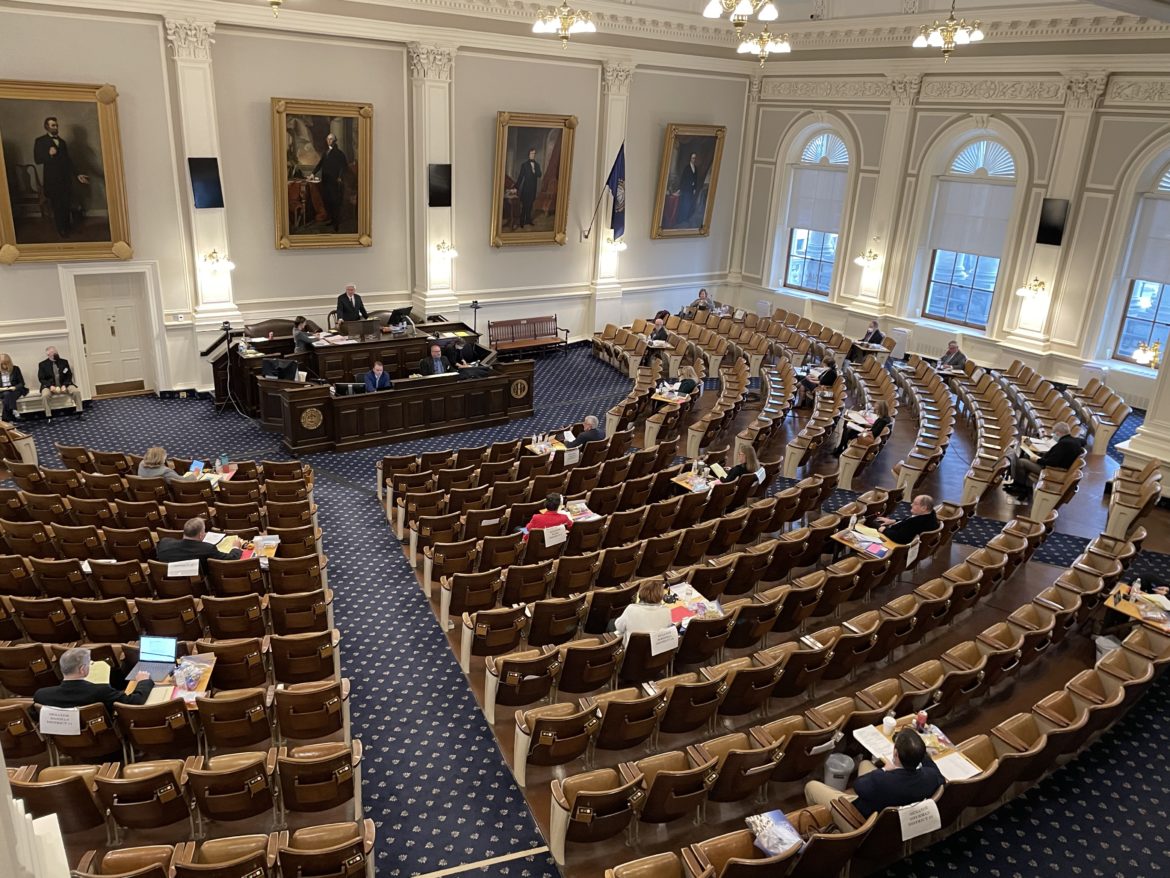By THOMAS P. CALDWELL, InDepthNH.org
CONCORD — The New Hampshire Senate began its first session of the new year by overriding Gov. Chris Sununu’s veto of a bill allowing alternative treatment centers to have a for-profit or non-profit model, but sustained his veto of a firearms registry bill.
Senators went on to pass measures that prohibit local government entities from passing ordinances banning firearms and limiting a governor’s ability to suspend civil liberties during states of emergency.
The sometimes-contentious Jan. 5 session, livestreamed from Representatives Hall at the State House, took up several bills carrying committee recommendations for passage.
State Sen. Bill Gannon, R-Sandown, argued that no one has died in the last five years from non-pasteurized dairy products, and Sen. Harold French, R-Franklin and Sen. Donna Soucy, D-Manchester, successfully offered an amendment to require warning labels on the packages. The bill passed as amended, which means it will have to go back to the House.
A number of Senate bills were either sent to interim study or killed.
The Senate sent to interim study a bill on CBD products from hemp, with Sen. Jeb Bradley, R-Wolfeboro, warning that producers are minimally regulated and the products may contain heavy metals, pesticides, and mold. As written, he said, it would force the Department of Health and Human Services to set up and staff the infrastructure to regulate CBD sales.
The most contentious discussion was on House Bill 307, prohibiting local government agencies from banning firearms, ammunition, knives, and firearms components and accessories. As originally written, the bill would not have allowed local municipalities or schools to establish regulations governing the use of such weapons, but an amendment struck the language on “use.”
The bill as passed punishes municipalities and their leaders if they are not in compliance. Fines could be up to $10,000. Municipalities will have 90 days to come into compliance and repeal any ordinance that violates the new statute.
Sen. Sharon Carson, R-Londonderry, said the bill would preserve residents’ constitutional rights to bear arms, but municipalities and schools would be able to establish rules governing the use of those weapons.
Sen. Rebecca Whitley, D-Hopkinton, argued that it is an anti-public safety rule that is intended to punish local officials who attempt to regulate weapons, including the possession of firearms on school grounds.
“These are the most punitive measures we’ve ever imposed on our municipal leaders,” she said.
Gannon said the bill ensures that New Hampshire citizens are not saddled with a patchwork of regulations.
Sen. Tom Sherman, D-Rye, spoke about his son’s experience very close to a mass shooting at the University of California at Santa Barbara raising concern that this bill removes the ability of UNH, state colleges and universities and the community college system to ban firearms on campus. Whitley filed an amendment to address that issue and it was defeated along party lines.
Sen. Bob Giuda, R-Warren, argued that everyone is safer when people with guns are present.
“There’s carnage where firearms are absent,” he said. “Laws do not stop people from committing violence with weapons acquired illegally. This amendment would allow me to be armed against them.” He added, “The banning of weapons is a violation of constitutional rights in two constitutions.”
Carson noted that New Hampshire, with its open carry laws, has been labeled the safest state in the nation. “Our gun owners are responsible gun owners,” she said.
The Senate passed the bill, 14-10. It will be sent back to the House because it was amended.
The body also passed HB 440, curtailing a governor’s power to act during a state of emergency. The bill prevents the governor from imposing any suspension of civil liberties.
Carson used the example of the internment of 120,000 Japanese-Americans during World War II.
“This country has realized we made a big mistake, and we (paid) reparations to those individuals, but can we ever really compensate them?” she asked. “It’s never right for any American to lose their civil liberties. We should be protecting our fellow citizens’ civil rights because the government isn’t always right.”
Supporters of the bill denied that it had anything to do with Sununu’s actions during the pandemic.
“I support Gov. Sununu, who has done an excellent job with the pandemic,” said Bradley. “This is about lessons learned. It’s about the constitutional rights that we all have as both American and New Hampshire citizens.”
Whitley argued that the language was overly broad.
“I personally feel deeply about our civil rights,” she said. “But the issue of emergency powers was discussed at length during the budget process, and it was an issue that’s critically important. It was hotly debated, and concessions were made and a compromise passed.”
She said the state needs to take a balancing approach when weighing individual rights against public safety. Passage of this bill may threaten constitutional balance of powers, especially during a state of emergency.
The bill passed on the same 14-10 split, but will be sent back to the House because it was amended.
T.P. Caldwell is a writer, editor, photographer, and videographer who formed and serves as project manager of the Liberty Independent Media Project. Contact him at liberty18@me.com.





